Central Pilio: Unforgettable Nature Walks and Culinary Delights
Experience Pilio’s scenic hikes, aromatic herbs,...
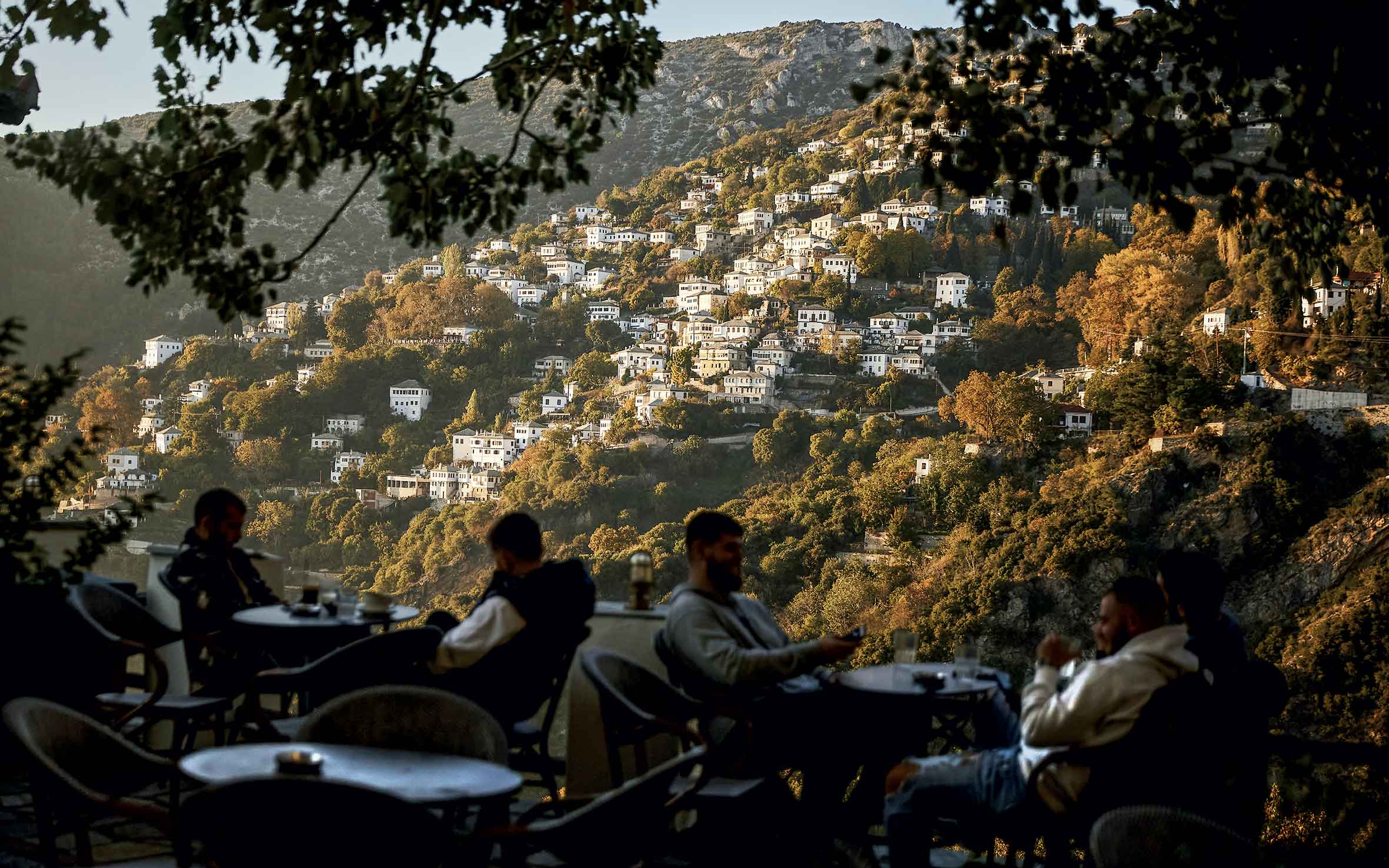
Portaria is located fewer than 3 kilometers from Makrynitsa. The Aeriko café, with its beautiful scenery, is about halfway between the two.
© Dimitris Vlaikos
Thick fog descended from the dense chestnut forest and swallowed up the grey stone roofs of the houses one by one. In between the stone-paved trails covered in layers of autumn leaves could be heard the sound of running water from the public fountains and the rustling of the branches of the ancient plane trees with their giant trunks.
The morning walk with Thanassis Pantes, a mountain guide, on the final leg of the “Water Trail,” an 8 km hike starting in Chania and ending in the central square of Portaria, awoke our senses and filled our heads with all kinds of knowledge about the local area. “Do you see those hollows under the fountains? They were for watering the merchants’ animals,” he explains.
A little later we would pass the stone arch of another famous trail, that of the Centaurs, located at the start of the road to Makrynitsa, which we would follow along the well-marked path that runs parallel to the Manas (“mother’s”) stream. The wooden bridges, fallen tree trunks, streams, scattered rocks and damp soil required some attention and created a sense of adventure.
Although we didn’t complete the 2 km walk to the top end of the village, the short walk was enough to make us feel like we were following in the footsteps of the mythical centaur Chiron, the wise teacher who raised the hero Jason.
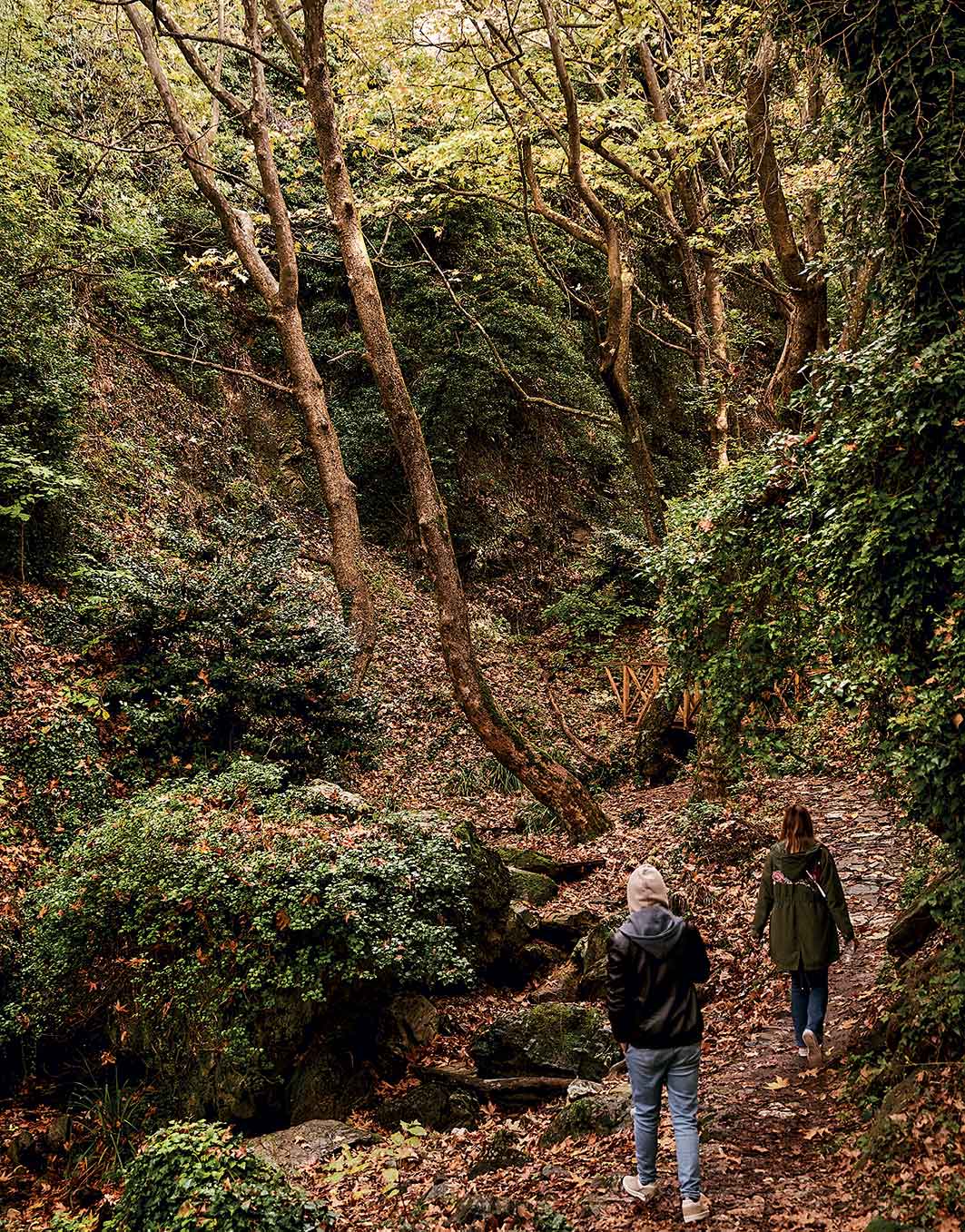
The Centaurs’ trail, which runs parallel to the Manas stream.
© Dimitris Vlaikos
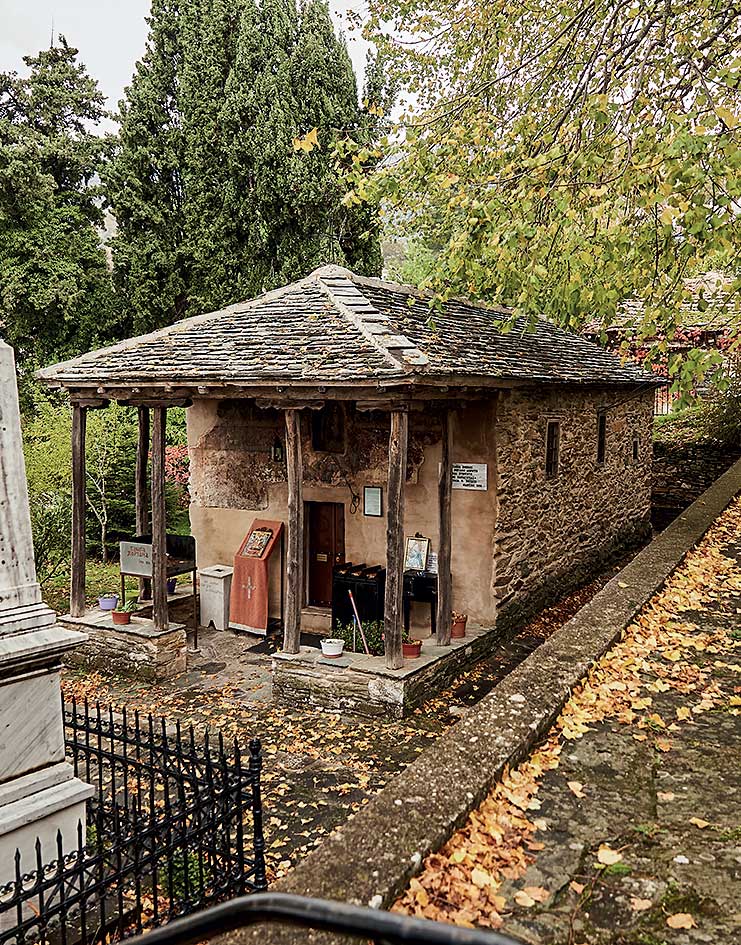
The Panaghia (Virgin) Portarea dating to the 16th century, in the courtyard of the church of St Nicholas in Portaria.
© Dimitris Vlaikos
There are two different stories of how Portaria got its name. The first refers to its geographical position at the gateway (“porta”) to Mount Pilio, as it is the first village you come to on the road from Volos, at an altitude of 650 meters. The second, and most popular, is linked to Panaghia Portarea, a timber-roofed chapel dating to the 16th century, which is found in the courtyard of the church of St Nicholas, the main church of the village. Surrounded by dozens of hydrangeas, the church, built in 1885, is a three-aisled basilica and contains a carved wooden altar almost two centuries old.
Close by, near the Tsopotos mansion, which now functions as a hotel, is the fountain of the writer Alexandros Papadiamantis. The novelist frequently visited his brother, who was the village secretary.
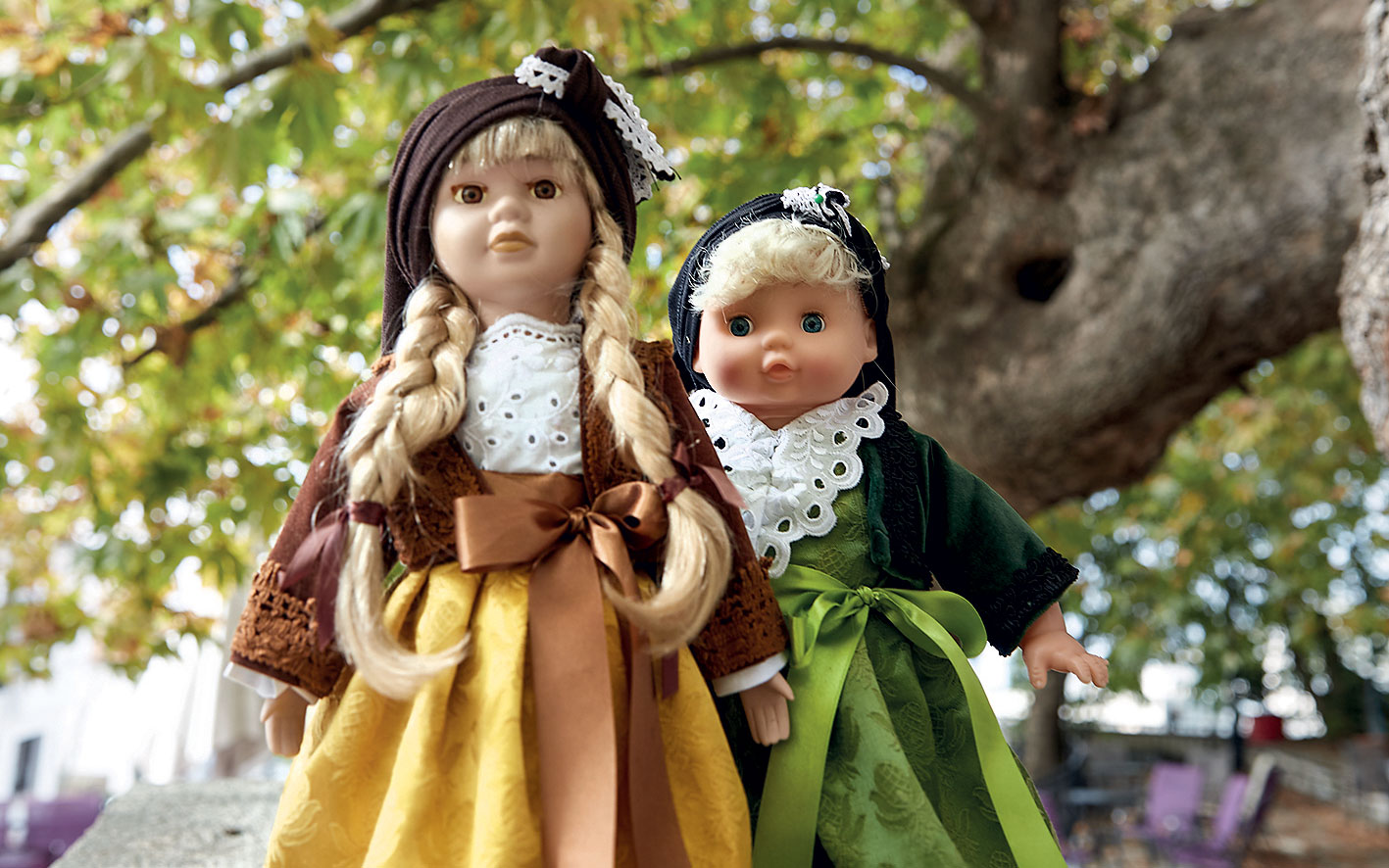
Traditional womens’ clothing from the Pilio region. The darker the skirt, the greater the age of the wearer.
© Dimitris Vlaikos
To get an insight into the social and economic development of Portaria, you only have to visit the Historical and Folk Museum, which is housed in the two floors of the Zoulias mansion. The imposing building with its double entrance staircase, the blue sign over the balcony and the identical layout on all floors, is a representative example of the “Egyptian” houses of Portaria, which were built in the late 19th century by immigrants who chased their luck to Egypt, where they were active in trading and banking. They differ from the traditional local houses, where the ground floor housed the households’ animals, bakehouse, storeroom, and grandparents’ room.
In a very well-presented exhibition curated by the museologist Nikos Kontovas which has been running since last May, you can see the china from the “Theoxenia” – the hotel which made Portaria famous as a holiday resort, before being burned by the Germans in 1944. The exhibits also include old postcards, cooking utensils and hand-crafted furniture. In Nikos’s office hang the paintings of Christina Zioga, the local painter who bought the house from the Zoulias family with her own funds, to donate it to the community.
Portaria Historical and Folk Museum: Tel. (+30) 24280.99920, Saturday-Sunday 10:30-14:30.
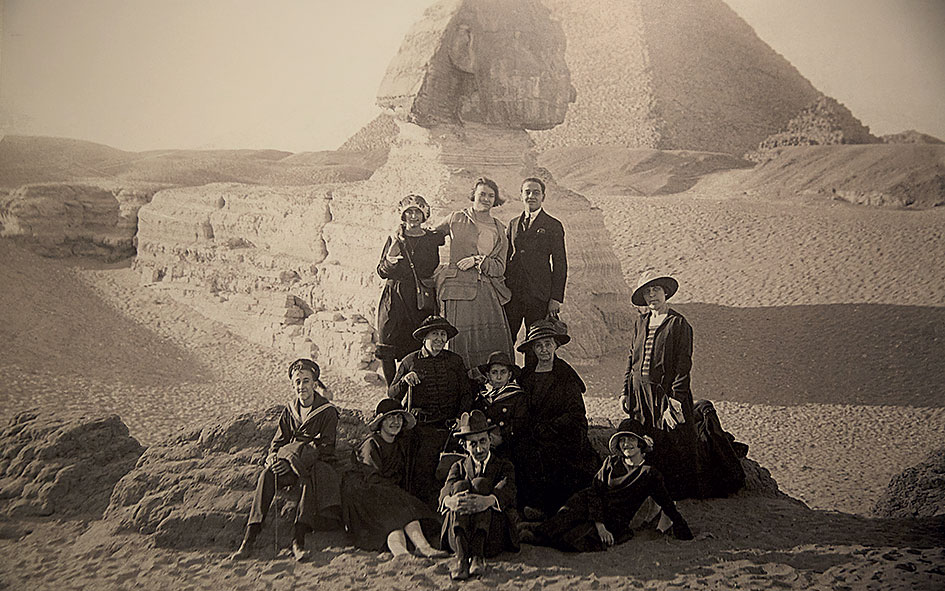
In the 19th century, immigrants from Portaria made their way to Egypt, where they were active in the cotton and tobacco trades.
© Dimitris Vlaikos
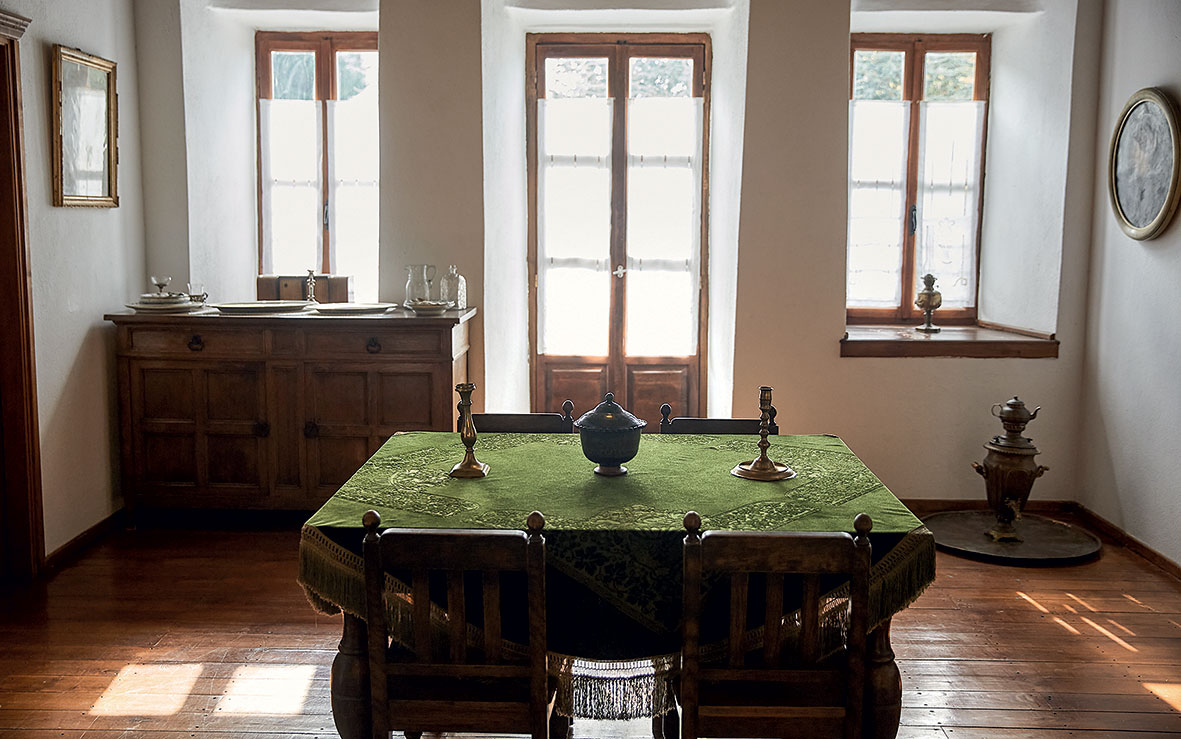
Interior of the Portaria Historical and Folk Museum
© Dimitris Vlaikos
“Just as our speech is clipped, so we used to embroider our tablecloths,” says Katerina Vlachou, an old pupil of the Embroidery School of Portaria, which sadly no longer functions. In her spare time, she maintains the old showroom at the school and offers guided tours to show visitors the ornate lace and macrame.
Holding up two dolls in local dress, she explains the social differences that held in the past. “Middle-class women wore a taffeta dress or skirt and two overlapping triangular scarves known as a “kalemkeri” tied over their hair, whereas wealthy women wore belts held together with gold brooches, and a scarf with a yellow tassel known as the “mafesi.” The older the woman, the darker the color of her skirt,” she explains.
The showroom of the Embroidery School is located next door to the Women’s Cooperative but does not keep regular hours.
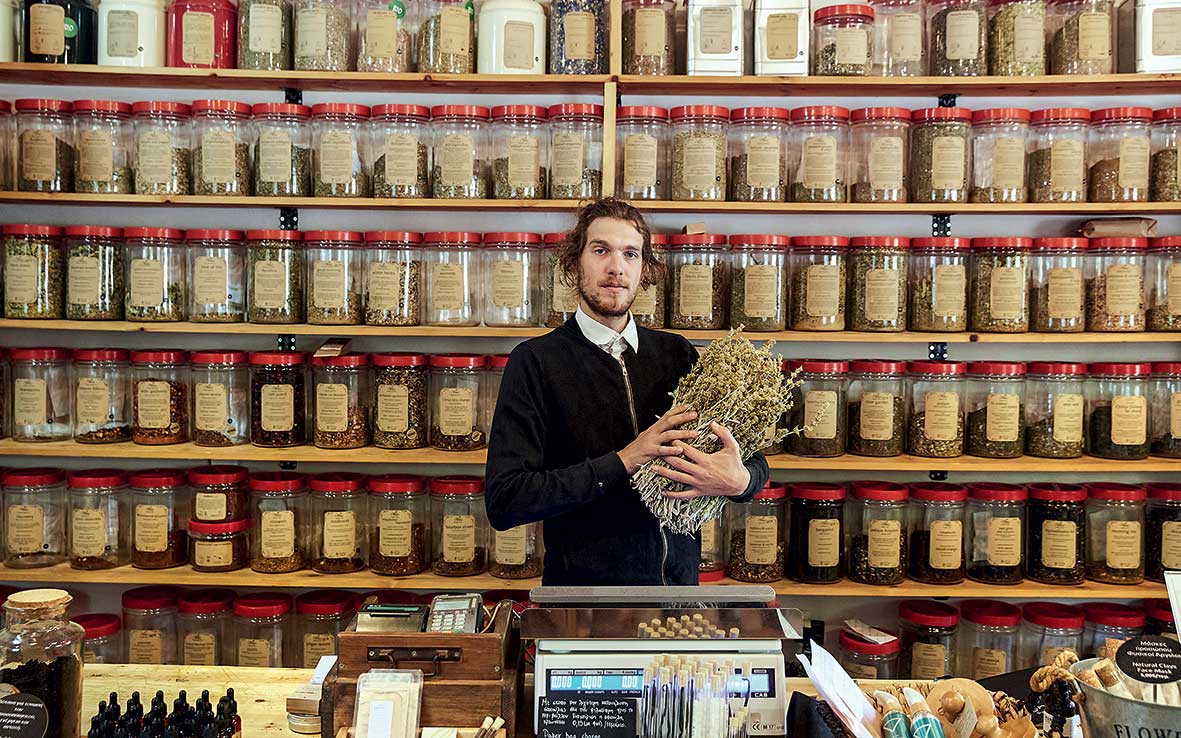
Panagiotis Psifos in Myrro, which stocks 2,500 different varieties of herbs, spices and teas.
© Dimitris Vlaikos
The Portaria Women’s Cooperative was founded in 1997. The tidy little shop with the wooden shelves sells “spoon sweets” – preserved fruit in syrup prepared by hand without preservatives, baklava with almond or walnut, traditional pasta and other treats.
“On Christmas day, those who take communion eat chicken soup after church. Another festive dish is pork stir-fried with leek,” Mary Vlachoutsou muses in the course of a discussion about Christmas traditions with older members of the co-op. “At the turn of the year, my father used to bring water from the fountain so that the new year found us clean,” continues Evi Georgoula, standing outside the Chrysso Milo (“Golden Apple”). The family-run workshop which has been going for over 40 years, exporting to Europe and Canada. The business crates unique delicacies out of local products, including crab-apple syrup, apple cider vinegar and walnuts in syrup.
Traditional remedies are also deeply rooted in Portaria. At elegant Myrro you will find over 2,500 varieties of spices, teas and herbs from around the world, with an emphasis on Greek products. Among them is “kentavrio,” a bitter herb found growing on the slopes of Pilio which is uses as a detox remedy.
Portaria Women’s Cooperative: Tel. (+30) 24280.99952 Chrysso Milo: Tel. (+30) 24280.99366 (workshop) Myrro: Tel. (+30) 24280.99094
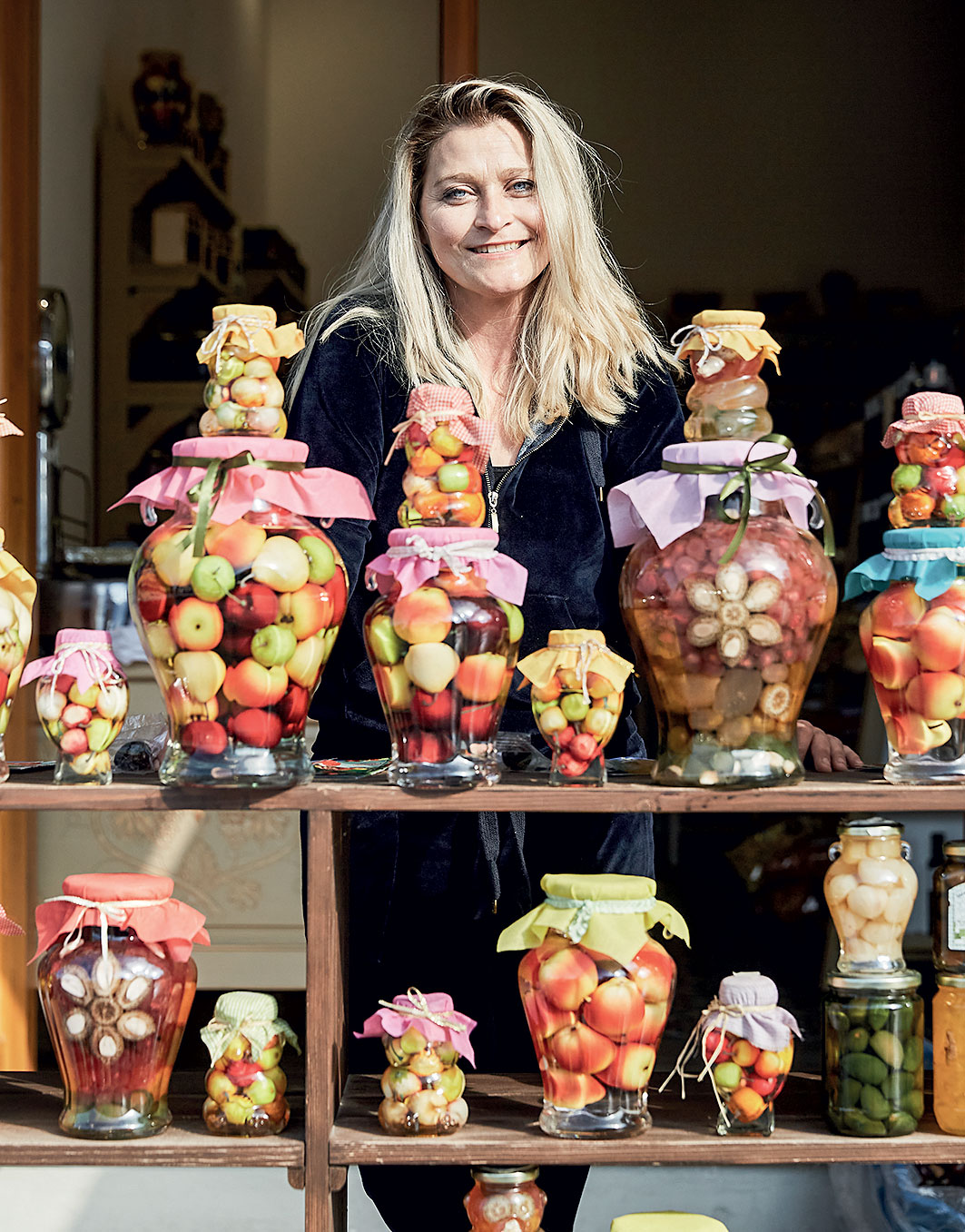
Evi Georgoula at Chrysso Milo, posing with her decorative jars.
© Dimitris Vlaikos
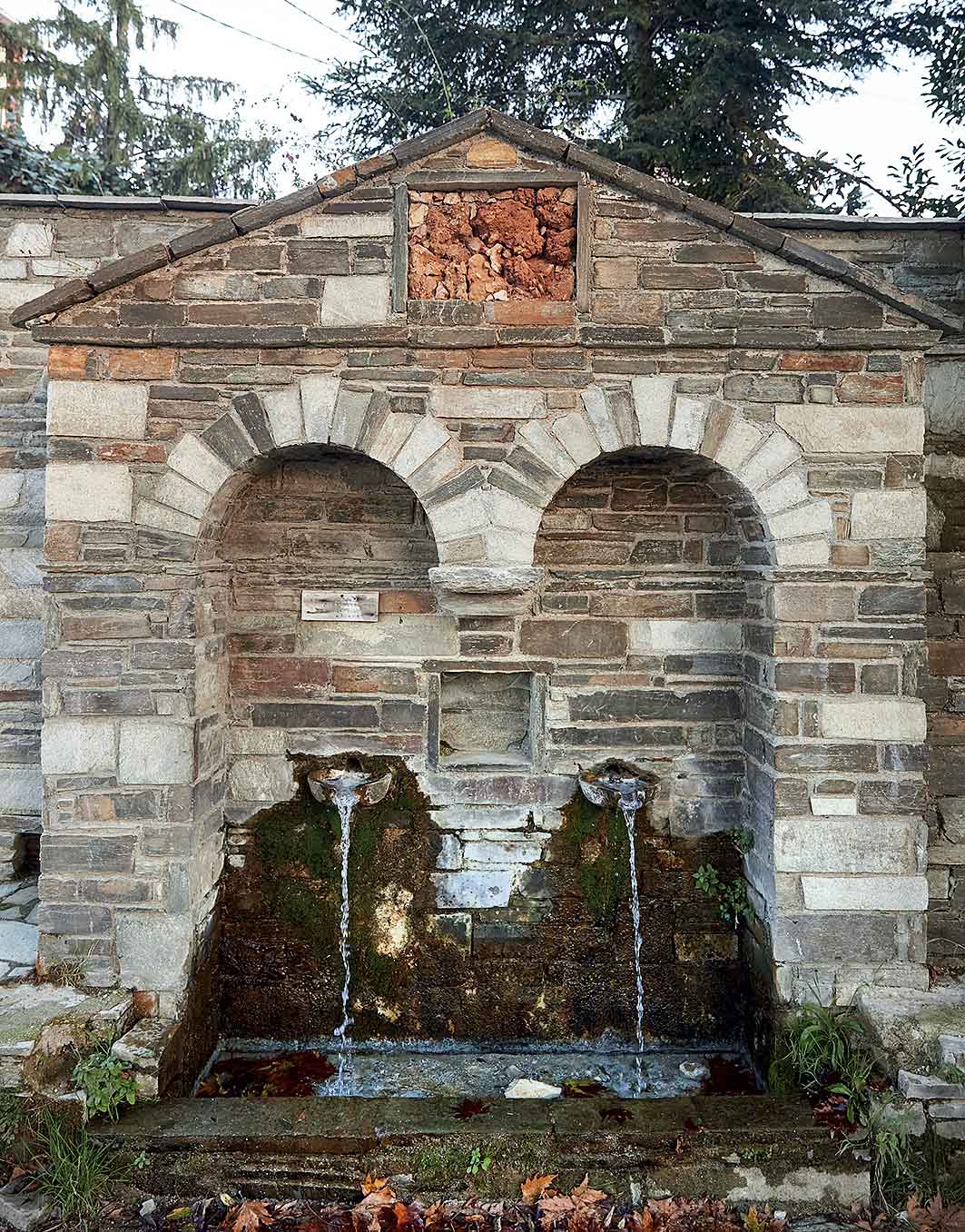
Portaria is full of running water and paved water fountains.
© Dimitris Vlaikos
Kritsa, located on the ground floor of the eponymous hotel, is the gastronomic treasure of the area. It bears the name of the cotton trader Thanasis Kritsas, who, on his return from Egypt in 1939, converted the former grocery store into an inn and restaurant named “Kentrikon.” The Karaïskos family lovingly cooks local dishes using fruit and vegetables from their farm, expertly showcasing the virtues of seasonality.
On the menu, which is overseen by Giorgos Kandilas, you will find warming soups, a variety of traditional pies and local dishes such as capon in wine with noodles, spentzofaï (braised sausage and peppers) and sauteed greens with eggs. Breakfast is thoroughly recommended – their sour trahanas, a kind of traditional dairy porridge, is truly an experience – and you can also buy a book of the recipes collected by the family.
Kritsa Gastronomy Hotel: Tel. (+30) 24280.99121
Despite being a mountain village, being close to the sea has influenced the local cuisine. At Me Mostra, tsipouro is accompanied by nibbles, whose variety depends on the size of the bottle. Filleted sardines, monkfish tail and grilled shrimp are the stars of the menu, followed by bastourma (cured seasoned beef) with eggs.
Next door, Agora 1955 brings a European air to Portaria. In the tasteful interior with its fireplace, wooden roof beams and stone walls, you will find a delicatessen with select local products, an impressive cellar, with a rich selection of local wines, a great spot for a coffee which comes fresh from a roastery in Volos, and an open kitchen specializing in breakfast and brunch dishes.
Me Mostra: Tel. (+30) 24281.01005 Agora 1955: Tel. (+30) 24280-99203
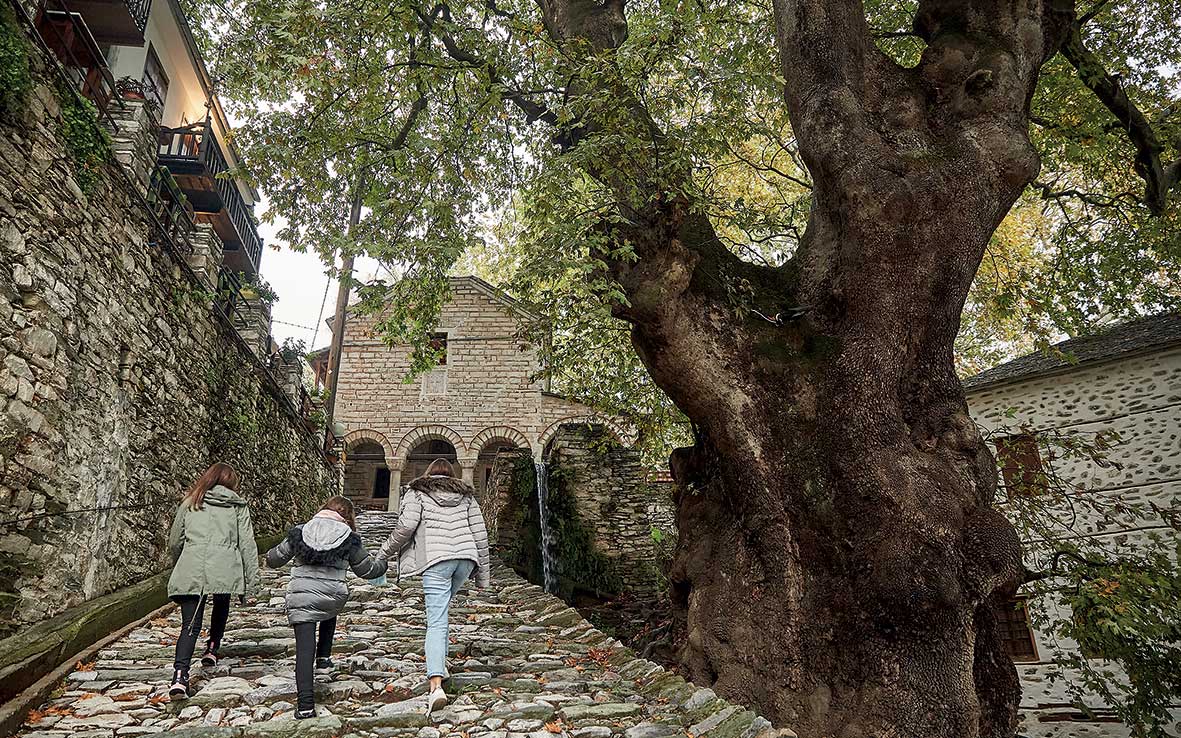
Makrynitsa is car-free, making for carefree strolling.
© Dimitris Vlaikos
Makrynitsa is just a 3 km drive from Portaria. The center of the village is arranged along two paved paths which come together in a square of rare beauty, dominated by the church of St John the Baptist and the public fountain with four bronze lions’ heads. One path starts at the top of the village by the main church dedicated to the Dormition of the Virgin, and the other just after the main parking lot on the left. Cars are not allowed in the village itself. Both offer panoramic views over Volos, as Makrynitsa is built into the steep hillside.
You must certainly visit the Museum of Byzantine Art and Civilization to admire the marble relief of the Virgin Mary, which originates from the 13th century monastery. At the Theofilos café you can see a fresco by the renowned folk artist depicting Katsantonis and his band in celebration, and you should also stop at Kardamo for the lemon gigantes (giant beans). Spyros Karabinas and his partner Telis Matis elevate the village’s gastronomy with hand-picked ingredients: sausage from Kanalia, baby goat from Trikeri and award-winning pasta from Pasta Pelion.
Don’t leave the village without stopping at Votanothiki, the natural product shop run by Kaiti Crhysocho. On its neatly arranged shelves you will find everything from walnuts and crab-apples to spoon sweets and pickled samphire.
Makrynitsa Museum of Byzantine Art and Civilization: Tel. (+30) 24280.90016, makrinitsamuseum.gr, Monday-Friday 10:00-16:00, Saturday-Sunday 10:00-18:00 Kardamo, Tel. (+30) 24280.90131 Votanothiki: Tel. (+30) 6938.923.627
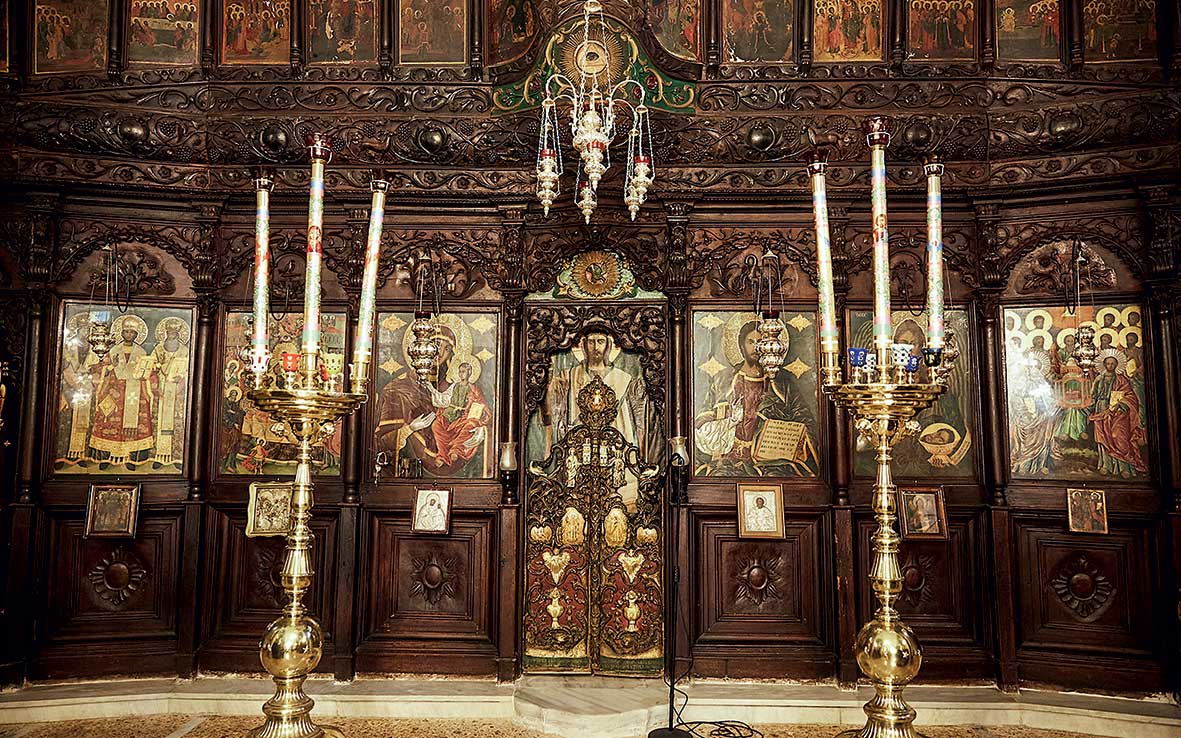
The altar at St John the Baptist in Makrynitsa.
© Dimitris Vlaikos
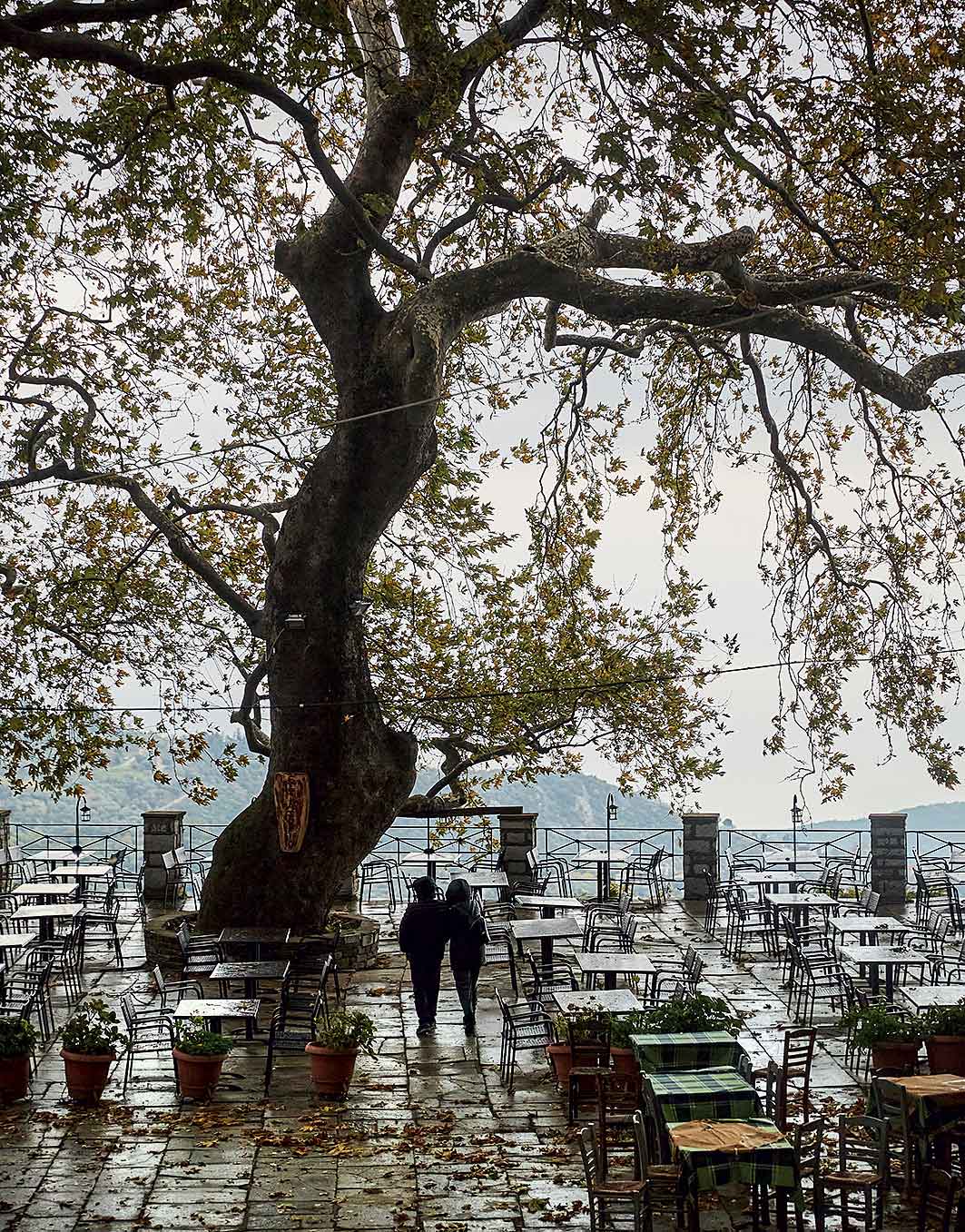
One of many ancient plane trees in the village.
© Dimitris Vlaikos
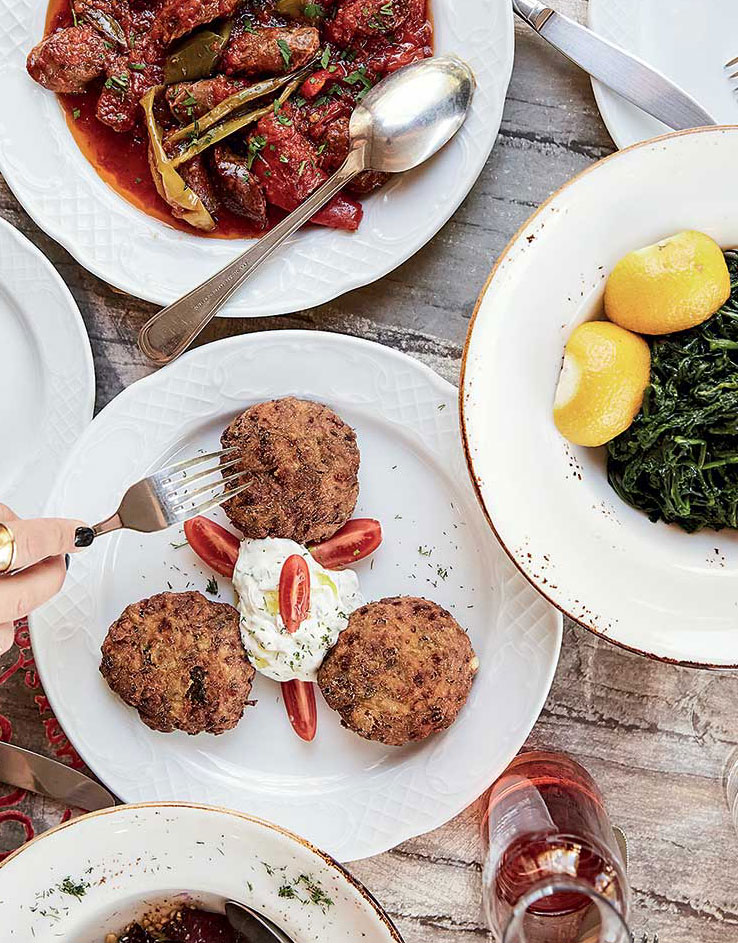
Dishes using local ingredients at Kerdamo restaurant.
© Dimitris Vlaikos
Portaria is 336 km from Athens (3 hours 45 minutes) and 219 km (2 hours 30 minutes) from Thessaloniki. Estimated cost of tolls is 80 euros and 55 euros respectively.
Erofili Hotel (Portaria, Tel. (+30) 24280.99916, erofilipelion.gr). Centrally located in the village, it offers enchanting views of Makrynitsa and Volos. It has 15 spacious rooms and suites, some equipped with a fireplace, spotless common areas and very hospitable staff. From 78 euros for a double room with breakfast.
Kritsa Gastronomy Hotel (Portaria, Tel. (+30) 24280.99121, hotel-kritsa.gr). A well-kept hotel with seven rooms with cosy interiors and views of the central square. From 60 euros for a double room with breakfast.
Archontiko Naoumidi (Portaria, Tel. (+30) 24280.99470, naoumidishotel.gr). Built in 1893, a unique example of 19th century architecture, offering luxurious accommodation in double rooms and deluxe suites. From 90 euros for a double room with breakfast.
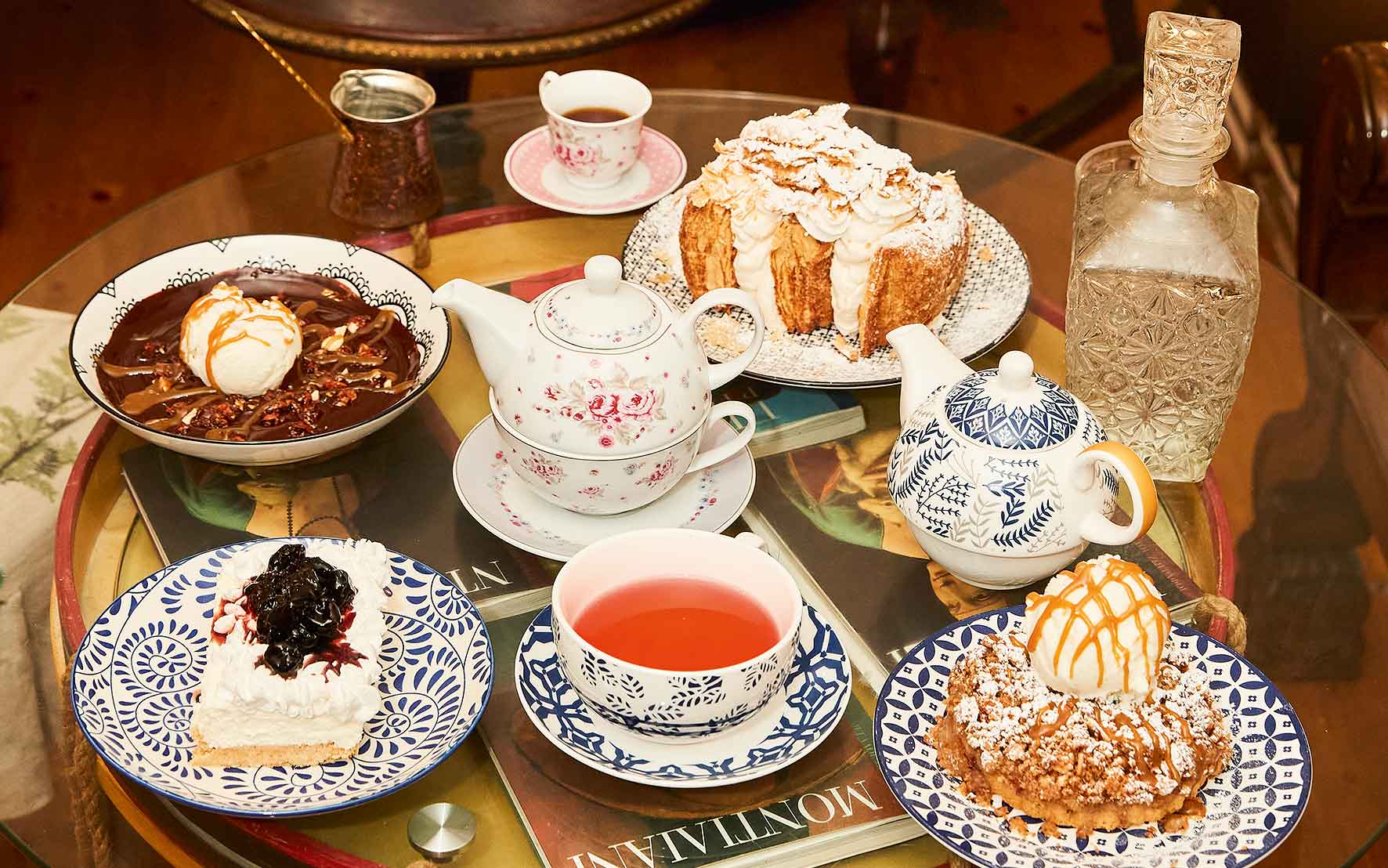
Alchimistis
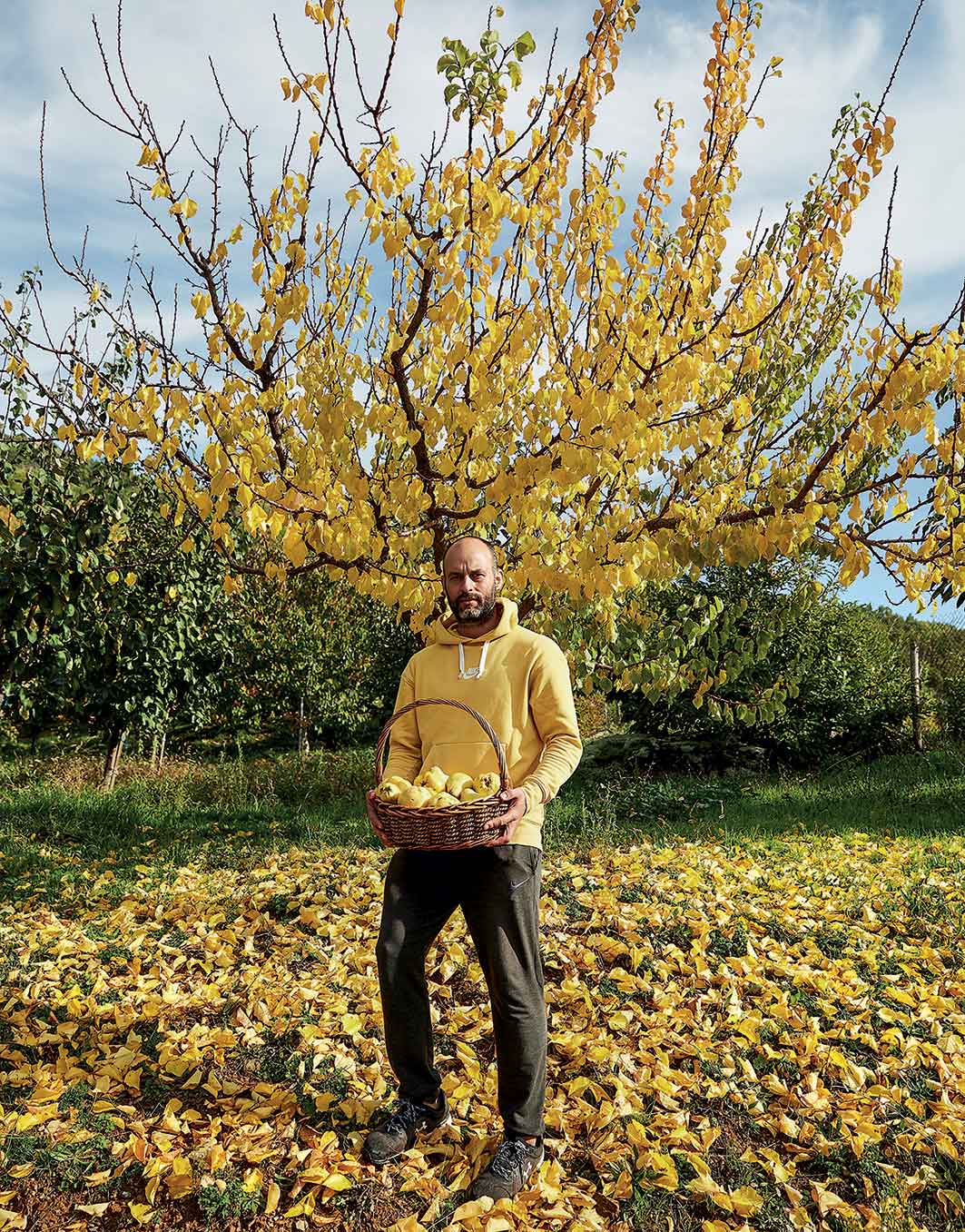
Karaïskos Farm
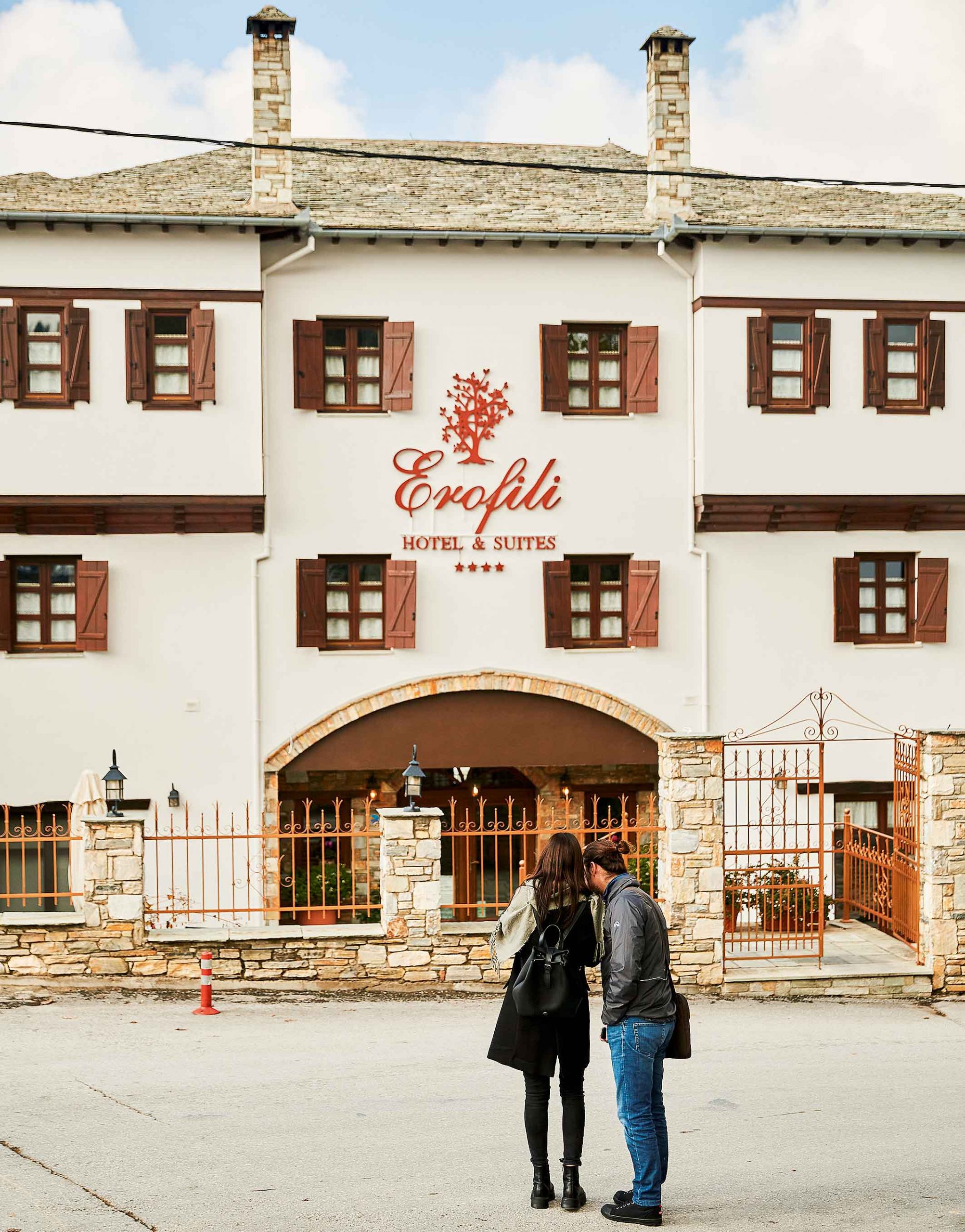
Erofylli Hotel
Karaïskos Farm (Portaria, Tel. (+30) 24280.99121, peliongastronomy.gr). Cooking lessons, archery, riding and many more leisure and learning activities are on offer at Karaïskos Farm. With over 200 trees, including quince, walnut, apricot and fig, and a large well-tended vegetable garden, it offers an ideal venue for winding down. During the holiday period, activity schedules are subject to change due to weather.
Alchimistis (Portaria, Tel. (+30) 24280.99744). This patisserie offers many specialties including baklava with almond and walnut, apple tart with almond crumble and salted caramel, and lemon pie.
Aeriko (Portaria-Makrynitsa road, Tel. (+30) 24280.99710). You must try apple pie with local apples, light orange cake and Greek coffee served with a sweet treat on the side. The interior has a fireplace, while the paved courtyard offers a sweeping view of Makrynitsa and Volos.
Pasta Pelion (Portaria, Tel. (+30) 6944.264.516, pastapelion.gr). Pasta produced in Portaria using traditional recipes and ingredients from local producers, without preservatives or artificial colors. They can be purchased at restaurants and shops in the village.
Walking Holidays (Tel. (+30) 6948.508.120, walkingholidays.gr). Experienced mountain guide Thanassis Pantes can accompany you on walks lasting a few hours or several days tailored to your interests, on the “Mountain of the Cetaurs”.
Orini Kalliergia (Makrynitsa, Tel. (+30) 6987.156.793). Born and raised in Makrynitsa, Konstantinos Sarakatsanos started cultivating herbs in 2018 at an altitude of 900-1,200 meters. He produces excellent oregano, mountain tea, lemon balm, pennyroyal, and other herbs. You will find them in the sweet-smelling shop he keeps at the entrance to the village.
Experience Pilio’s scenic hikes, aromatic herbs,...
The charming port city of Volos...
Discover five mountain destinations where crisp...
Explore Greece’s Christmas traditions, from sweet...